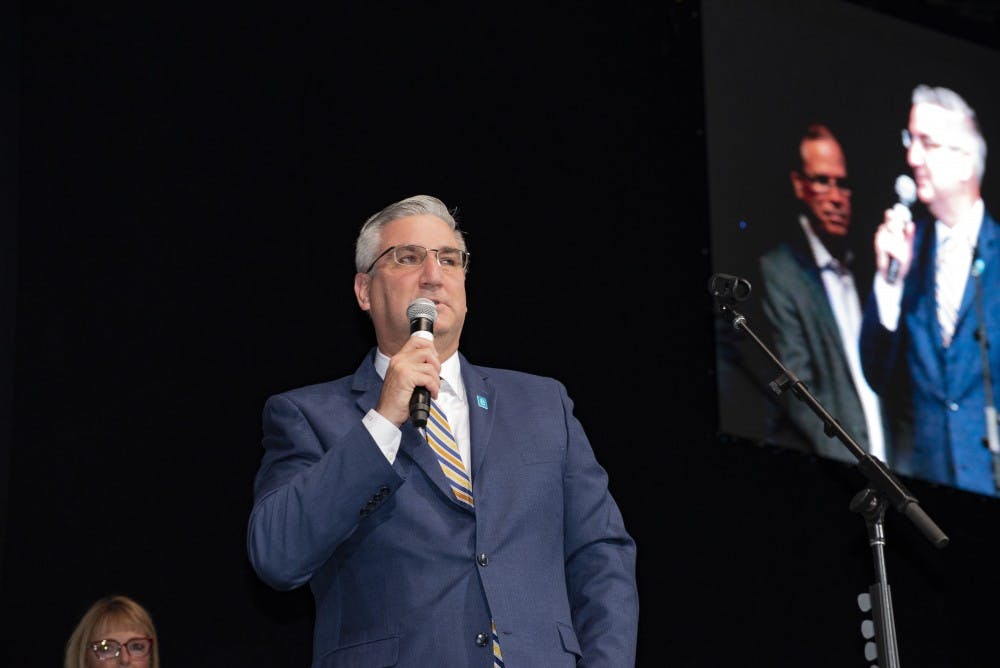Beginning June 8, Indiana’s main political parties hosted their semiannual conventions to discuss adjustments to their platforms, as well as the current status of their party.
The GOP’s convention in Evansville, Indiana, which took place June 8 and 9, identified itself with a celebratory nature, with most people lauding the president’s approach, as well as the party’s prolonged success throughout the state.
The INDEMS meeting in Indianapolis came off as more impassioned, scrupulous and hopeful for the implementation of diverse policy.
Decisions on a party’s manifesto should be followed closely by any self-respecting Indiana voter, and each party’s convention revolved around several moral debacles Hoosiers should keep tabs on as we move closer to the November.
The first convention that took place was that of the GOP.
Upon arrival at 12 p.m. June 8, one thing I took note of was the general nature of the party’s delegates and the atmosphere. Those in attendance were jovial and relatively carefree. The only point of worry leading up to and during the party’s collection was a lack of youth participation, largely believed to be due to an absence of progressive policies.
There were meetings on policy set to take place the first day in different conference rooms, but there were few that sat in on them, other than those on the committees making the final amendments to the platform.
This struck me as concerning, but delegates acted as if it were the norm, so it did not register with me again until later.
On June 9, delegates heard from several different speakers from within the GOP, including Indiana Governor Eric Holcomb.
"This is Indiana's moment," Holcomb said. "The eyes of the nation, indeed the world, I can report to you in all honesty, are on Indiana."
Following his speech, discussions among party leaders about the inclusion of language on marriage rights lit a fire under many delegates, and the vote was ultimately left up to them. The party chose to retain its 2016 phrasing on marriage, which included their belief that “strong families, based on marriage between a man and a woman, were the foundation of society."
This was an upsetting decision, but not necessarily one that I was surprised by. Another striking situation befalling the convention was a protest occurring prior to that vote.
Roughly 70 individuals from the “Wear Orange for Gun Safety” protests were marching down Main Street and chanting in obvious opposition to the GOP’s presence in Evansville. Most delegates paid little attention, and hastily moved past the Ford Center's metal detectors and placed their votes.
The INDEMS convention took place June 15 and 16, but I was only able to attend the second day when the delegates convened.
On Saturday, the docket was filled with many different meetings throughout the Indianapolis Convention Center, with an attendance that immediately appeared to be larger and noticeably more diverse. There were noticeably more women and people of color, aligning well with the party’s credo.
One meeting that I visited was that of the College Democrats of Indiana, which had many students as well as older Democrats simply interested in the group’s ideals. The noise reverberated into the room created by the Stonewall Democrats, also known as LGBTQ+ Democrats, located next door. This clamor for representation, unification and fastidious legislation was summed up with the meeting held for the permanent Resolutions Committee.
Hundreds of those in attendance were spilling out the door during this meeting, and there were many adjustments to the platform that were proposed — so many that some were left undecided until the next convention. This very exact nature of the party may be due to the stress of an upcoming "blue wave" or the continuing search for a party leader approaching 2020.
Immediately following the Resolutions meeting, delegates heard from speakers including speculated presidential candidate Eric Holder, Senator Joe Donnelly and other liberal bigwigs from within the state.
One note I took was the essence of these speeches in comparison to those by Republican leaders at the GOP conference. Where the Democrats were more emblazoned, fiery and angry towards social failings under a regressive administration, the Republicans were soothed, celebratory and relaxed leading into November.
The polarization between the two sides is a positive feedback loop aided by little voter diligence to remain informed on the decisions and authenticity within each party.
Breaching this echo chamber and creating policy informed by everyone’s motives is what will incite long-lasting transformation in Indiana and beyond.






